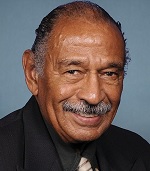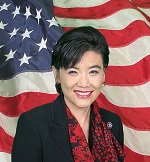[AUTHENTICITY CERTIFIED: Text version below transcribed directly from audio]
 Chairman Goodlatte:
Many Filipinos served bravely with the
United States Armed Forces
during World War II in the Philippine Scouts.
The U.S. Army writes that early in World War II General MacArthur had his entire
army withdraw to the Bataan peninsula and to Corregidor Island to hold
off the Japanese Army until the U.S. Navy could bring reinforcements and
supplies.1
Chairman Goodlatte:
Many Filipinos served bravely with the
United States Armed Forces
during World War II in the Philippine Scouts.
The U.S. Army writes that early in World War II General MacArthur had his entire
army withdraw to the Bataan peninsula and to Corregidor Island to hold
off the Japanese Army until the U.S. Navy could bring reinforcements and
supplies.1
The Philippines Scouts, side-by-side with the U.S. National Guard and Philippine Army infantry units, defeated the Japanese Army in numerous actions in the interior and on the coastlines of Bataan. Survivors of the Battle of of Bataan, to a man, describe the Philippine Scouts as the backbone of the American defense there. President Franklin Roosevelt awarded the U.S. Army's first three Congressional Medals of Honor of World War II to Philippine Scouts.2
By March 1942 the Japanese Army had marched through Southeast Asia and completely overrun every country and island in the western Pacific with the exception of the Philippines. The Philippines and MacArthurís army were alone on the Bataan peninsula of Luzon Island. The Philippine Scouts, a few U.S. Army National Guard units, and ten divisions of poorly-equipped, almost untrained Philippine Army soldiers held out for four months against the Japanese.
With the U.S. Navy at Pearl Harbor in shambles and the Japanese Navy blockading the Philippines, there was no way for America to get reinforcements, food, or medicine to the troops on Bataan. Nonetheless, they held out while malaria, dysentery, and malnutrition ravaged their ranks, and Japanese attacks drove them further down the Bataan Peninsula.
Fresh Japanese troops began a crushing attack on the U.S. Forces on Bataan, April 3, 1942. Although the men fought bravely the Battle of Bataan ended April 9, 1942, when General Edward King surrendered rather than see any more of his starving, diseased men slaughtered by the advancing Japanese Army. At that point, 70 -- 75,000 men became prisoners of war -- about 12,000 Americans and 63,000 Filipinos. What followed was one of the worst atrocities in modern wartime history: the Bataan Death March.
America owes a debt of gratitude to those Philippine Scouts who gave their lives fighting with the U.S. in World War II. Posthumous citizenship would be a fitting tribute to their sacrifice. Concurrently, the Posthumous Citizenship for Active Duty Service Act does provide a procedure for an alien who is killed while serving on active duty status with the U.S. Armed Forces, during periods of hostility, to be granted possible citizenship. The House Report indicated that posthumous citizenship is a symbolic measure to express that the United States honors the memory of the individual who gave their life for our country.
That statute provides that an alien is eligible for posthumous citizenship if they --
one, served honorably in an active-duty status in the military, air, or naval forces of the United States during any period [of hostilities including World War I, World War II, the Korean War, the Vietnam War, or other period of hostilities designated by the President by Executive Order (including the current war on terror)];
two, died as a result of injury or disease incurred or aggravated by that service; and
[three, at the time of enlistment, reenlistment, extension of enlistment, or induction were 1) in the United States, the Canal Zone, American Samoa, or Swains Island, or on board a public vessel owned or operated by the United States for noncommercial service, whether or not he was a lawful permanent resident, or 2) at any time subsequent to enlistment or induction had become a lawful permanent resident].
The Philippine Scouts who lost their lives in World War II do not qualify for posthumous citizenship because they cannot meet this third requirement -- essentially, they did not enlist in the United States and were never permanent residents. Representative Walter Jones has introduced H.R. 3449, which would waive this impediment and finally allow America to honor these men. I commend Mr. Jones for introducing this bill and I urge my colleagues to support it.
And at this time, I am pleased to recognize ranking member, Mr. Conyers, for his opening statement.
 Representative Conyers:
Thank you, Chairman Goodlatte. Members of
the committee, 70 years ago we led the world, in effect, to defeat the
fascist Axis Powers of Germany and Japan. During World War II, over
250,000 Filipinos fought alongside American forces. And many of them paid
the ultimate sacrifice to take back their country during the Japanese
occupation.
Representative Conyers:
Thank you, Chairman Goodlatte. Members of
the committee, 70 years ago we led the world, in effect, to defeat the
fascist Axis Powers of Germany and Japan. During World War II, over
250,000 Filipinos fought alongside American forces. And many of them paid
the ultimate sacrifice to take back their country during the Japanese
occupation.
Today we're marking up a bill that recognizes these brave Filipino soldiers. As one of the three remaining Korean War veterans in Congress, Iím pleased to commemorate their service by extending honorary citizenship to these brothers-in-arms who died while serving on active duty with American armed forces during World War II.
We should also consider the Filipino Veterans Family Reunification Act introduced by our colleague from Hawaii, Mr. Mark Takai. There are approximately 6,000 Filipino-American World War II veterans still alive in the United States today. And many of them require the care and assistance of their families as they age; a[nd] many greatly desire to have their family members in the United States with them during their final days.
But even for United States citizens from the Philippines, the waits for family members can be 10 or 20 years due to annual visa quotas. Representative Takaiís proposal would exempt children of Filipino World War II veterans from annual visa caps. [It] is a narrow, sensible, and humane proposal that is consistent with the spirit of the bill weíre marking up today. And I'm glad we're coming together to honor Filipinos who served our country in World War II. I urge us to do a bit more on behalf of these Filipino veterans, who are part of the Greatest Generation, and I support the measure.
And I yield back the balance of my time. Thank you.
* * * * * * * * *
 Representative Lofgren: As Mr.
Conyers said in his opening statement, there are
approximately 6,000 Filipino American World War II veterans still alive
in the United States today, and they are very anxious to have family
members with them in the United States during their final days.
They may need the care and assistance of their
families as they age. But even for U.S. citizens in the Philippines the
waits for family members under our current visa system can be 10 or 20 years.
Representative Lofgren: As Mr.
Conyers said in his opening statement, there are
approximately 6,000 Filipino American World War II veterans still alive
in the United States today, and they are very anxious to have family
members with them in the United States during their final days.
They may need the care and assistance of their
families as they age. But even for U.S. citizens in the Philippines the
waits for family members under our current visa system can be 10 or 20 years.
So this amendment would address these visa backlogs by exempting children of certain Filipino World War II veterans from the annual visa caps. It actually tracks the bill introduced by our colleague Congressman Takai from Hawaii. It's a narrow measure that recognizes the sacrifice of Filipino veterans and will ensure that they're reunified with their families. And I think it's important that we join together to focus on the families of these World War II veterans from the Philippines who served our country and the world so well.
And at this point I would yield to my colleague from California, Ms. Chu, for a few words.
 Representative Chu: Thank you,
Congress Member Lofgren, for introducing this amendment. Over half a century ago
Filipino soldiers answered the
call to arms by President Franklin D
Roosevelt -- and later fought on behalf of American forces in the
Philippines during World War II. Giving posthumous citizenship to those
who sacrificed their lives for the U.S. and our values is the right
thing to do by these families.
Representative Chu: Thank you,
Congress Member Lofgren, for introducing this amendment. Over half a century ago
Filipino soldiers answered the
call to arms by President Franklin D
Roosevelt -- and later fought on behalf of American forces in the
Philippines during World War II. Giving posthumous citizenship to those
who sacrificed their lives for the U.S. and our values is the right
thing to do by these families.
However, I don't believe that it's enough. Today, there are as many as 26,000 of these brave soldiers who are living in the U.S. but who cannot reunite with their family. These veterans are U.S. citizens. But because of her extremely backlogged family visa system, many Filipino families are forced to wait over 20 years to reunite.
Take the case of Mr. Art Kaleda. Over 70 years ago he helped our military as a guerilla intelligence officer during World War II. In 1996 Mr. Kaleda, a U.S. citizen, petitioned for his three sons who live in Manila. Currently, the Department of State is processing applications for 1993. That means Mr. Kaleda, now 90 years old, has waited over 22 years for his son's visas, and still has to wait several more years until the visas become available. Meanwhile, last year Mr. Kaleda's wife passed away, unable to spend the last years of her life with her children. This is unacceptable.
Only comprehensive immigration reform will get to the root of the problem, but Congress should at a minimum ensure Filipino veterans who put their lives on the line for our country are able to reunite with their loved ones. It is our duty to take care of those who fought for this country. This means fully compensating these families that have suffered such long separations from their loved ones. To not do so would be a monumental omission, an injustice to the memory of those service members who made the ultimate sacrifice for the freedoms we enjoy today.
And that's why I'm a proud co-sponsor Congress member Takai's Filipino Veterans Family Reunification Act, H.R. 483, which would exempt the children of Filipino World War II veterans from the visa caps and expedite their path toward citizenship.
The bill before us today is the right thing to do, but we must do much more to ensure that veterans like Mr. Kaleda are properly honored and are able to have the most important thing for them -- the ability to live out their last years with their children.
Thank you, and I yield back.
 Book/CDs by Michael E. Eidenmuller, Published by
McGraw-Hill (2008)
Book/CDs by Michael E. Eidenmuller, Published by
McGraw-Hill (2008)
1 Click here for military historian Louis Morton's account of this episode.
2 The medalists were Sergeant Jose Calugas "for action at Culis, Bataan on January 6, 1942"; Second Lieutenant Alexander R. Nininger "for action near Abucay, Bataan on January 12"; and to First Lieutenant Willibald C. Bianchi "for action near Bagac, Bataan on February 3, 1942." [Source: Wikipedia.org]
Original Text Source: https://judiciary.house.gov/
Images Source: Wikipedia.org
U.S. Copyright Status: This text = Property of AmericanRhetoric.com. Images = Public domain.
